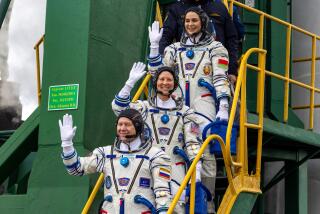Shuttle Crew Fixes Last of Dying Batteries
- Share via
KENNEDY SPACE CENTER, Fla. — Space shuttle Atlantis’ astronauts completed the most important work of their repair mission to the international space station Wednesday, replacing a fourth and final dying battery in the Russian control module.
American Susan Helms and Russian Yuri Usachev finished the job ahead of schedule Wednesday evening. All that remained was for the units to be charged and tested by ground controllers to restore the space station to full electrical power.
NASA pushed up Atlantis’ docking mission so the crew could replace the four dead or dying batteries. Careless overcharging by flight controllers in Moscow had ruined all but two of the six batteries.
The astronauts also installed four new cooling fans and 10 new smoke detectors Wednesday.
In between chores, they assured everyone back home that they are breathing easy aboard the international space station, thanks to improved ventilation and small fans. The last visitors to the space station were sickened by stale air. NASA did not want a repeat.
Atlantis’ astronauts initially encountered 86-degree heat and stagnant air inside the space station, which had been shuttered for a full year.
But by switching the position of a few valves, rearranging airflow ducts between the linked shuttle and station and adding some fans, the air quality improved “probably about 100% within just a few hours,” said pilot Scott Horowitz.
“That seems to have done the trick,” he said.
The astronauts are equipped with personal fans to prevent exhaled carbon dioxide from pooling around their heads.
Once the circulation had improved, the temperature dropped into the high 70s.
The astronauts said the space station--in particular the Russian-made Zarya control module--is not as noisy as they expected. The din was lessened one year ago with the installation of mufflers.
“It’s just kind of like motors running in the background, machinery,” Horowitz said. “All the insulation wrap they put on has helped.”
NASA is not overly concerned about the noise level for visiting shuttle crews. It is a serious issue, however, for the crews who will spend months on board.
Wednesday night, the pilots used the shuttle thrusters to lift the space station nine miles, the second night in a row Atlantis gave the outpost an orbital boost. A third and final raising is planned for today, at which time NASA hopes to have hoisted the space station into an orbit 230 miles from the Earth’s surface. The space station had sunk to an orbit as low as 202 miles because of increased solar activity, which causes the atmosphere to expand and the spacecraft to sink.
More to Read
Sign up for Essential California
The most important California stories and recommendations in your inbox every morning.
You may occasionally receive promotional content from the Los Angeles Times.













